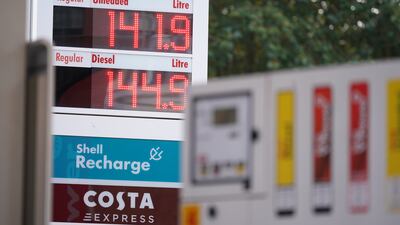Britain’s inflation rate dipped to 3.1 per cent in the 12 months to September after the artificial blip caused by last year’s ‘Eat Out to Help Out,’ scheme dropped out of the figures, but higher prices are still to come.
The increase in consumer prices came in a notch lower than the 3.2 per cent seen in August, the Office for National Statistics said on Wednesday, but the reading was still well above the Bank of England’s 2 per cent target for a second month.
Financial markets are pricing in a BoE lift to interest rates next month to contain an upward spiral in prices, as central bank officials expect the headline inflation rate to jump above 4 per cent this year.
Eat Out to Help Out was a discount scheme devised last year by Rishi Sunak, Chancellor of the Exchequer, designed to attract diners back to hospitality venues to support the ailing sector after coronavirus lockdowns.
“Annual inflation fell back a little in September due to the unwinding effect of last year’s Eat Out to Help Out, which was a factor in pushing up the rate in August,” said ONS head of prices Mike Hardie.
“However, this was partially offset by most other categories, including price rises for furniture and household goods and food prices falling more slowly than this time last year.”
The cost of transport led gains in inflation in September, with a hefty jump in petrol prices even before the fuel crisis reduced supplies across the country.
Average petrol prices were at 134.9 pence ($1.85) per litre in September 2021, compared with 113.3 pence per litre a year earlier, as fuel provided an upward pressure on inflation, the ONS said.
Used car prices also rose sharply amid a global shortage of semiconductors, increasing 2.9 per cent on the month to September.
The cost of goods produced by factories also rose again with metals and machinery showing a notable price rise, while road freight costs for UK businesses continued the upward trajectory seen over the summer, Mr Hardie said.
These factors were offset by a sharp decline in prices at hotels and restaurants, which fell back in September when compared with a year ago.
Susannah Streeter, senior investment and markets analyst at Hargreaves Lansdown, said inflation could reach 5 per cent next April despite the slight dip this month, which could lead the BoE to increase interest rates imminently.
“With prices staying stubbornly high and another surge expected, a gentle rise in interest rates before the end of the year still looks likely if there is any chance of keeping a Goldilocks economy [where an economy is not too hot or too cold but just right, stealing a line from the popular children's story Goldilocks and the Three Bears] within reach,” Ms Streeter said.
“Too much inflation in the mix risks the economy getting too hot, leading prices to spiral upwards. If rates are pushed up rapidly, there’s a risk it gets too cold, freezing off economic growth. A 2 per cent inflation target is considered just right, as long as the economy also keeps growing.”
Chancellor of the Exchequer Rishi Sunak said the government is working with businesses and international partners to address the pressures of rising inflation as global shocks push up prices around the globe.
“We are supporting people with the cost of living, including through a new £500 million support fund to help vulnerable households, the energy price cap, and assistance with energy bills through the winter,” Mr Sunak said.
Britain’s recovery is already considered to be cooling rapidly amid supply chain issues, labour shortages and the soaring energy price.
Avoiding the bad dream of stagflation will still be the priority, Ms Streeter said, rather than the lofty aims of a Goldilocks economic utopia.
“If gas prices continue to spike and power rationing is introduced by energy intensive industries, economic growth could be knocked back into a downturn,” Ms Streeter said.
However, with the Monetary Policy Committee not entirely aligned on a rate rise, they may hold off from voting for an increase in November.
“A certain amount of nervousness ripples through the financial markets at the very thought of a rate hike, given that investors have become somewhat used to this era of ultra-low rates, so this edge downwards in CPI in September may provide some short-term relief,” Ms Streeter said.
“But even if the Bank of England does raise the base rate by a few notches in the months to come, it isn’t forecast that it will go much beyond 1 per cent next year.
“That is because central bank policymakers still believe inflation is transitory. Like porridge without enough milk, it’s sticking around for a lot longer than was previously thought, but is expected to ease off as pandemic supply chain issues finally lift."
Separately, house price growth returned to double digits in August, the ONS said, with average house prices up 10.6 per cent.
The average house price hit £264,000 in August, with homes costing £25,000 more than a year ago despite a temporary summer lull amid the tapering of the stamp duty holiday.
Meanwhile, eurozone inflation hit 3.4 per cent on the year in September, a 0.5 per cent increase on August as more expensive energy and services increased prices, the European Union's statistics office Eurostat said.
While the headline number was well above the European Central Bank's target of 2 per cent, the higher rate was caused mainly by the 17.6 per cent year-on-year surge in energy prices.
The ECB expects consumer prices to start easing next year.


